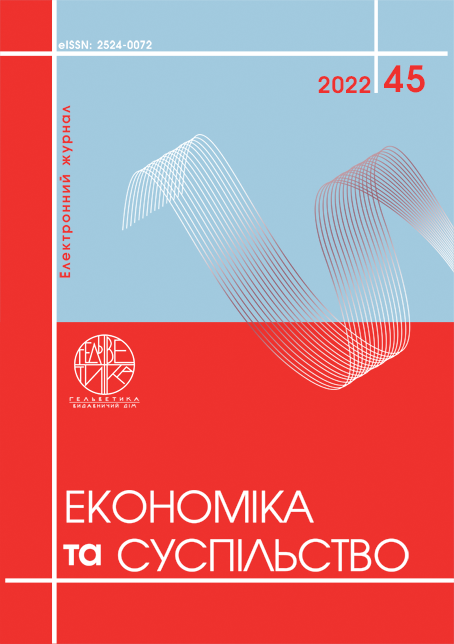PROGRESSIVE BUSINESS MODELS: DOMINATING THE VALUES OF INDUSTRY 5.0
Abstract
Business model conceptualization, based on the challenges of Industry 5.0 for sustainable development, takes into account social, economic and environmental aspects. It is obvious that in order to achieve the goals of Industry 5.0, not only the commercialization of innovative products and technologies is required, but also a total system of values that is transformed through effective business models. A comprehensive study of the phenomenon of the fifth industrial revolution is carried out. Different interpretations of the term “Industry 5.0” are considered; key characteristics of previous industrial revolutions are identified and analyzed. The evolutionary character of Industry 5.0 is manifested in the complement and development of Industry 4.0 technologies, which include the following: frugal additive manufacturing, transparent production service, hyper-customization, cyber-physical cognitive systems. Industry 5.0 differs from the digital revolution of Industry 4.0 in the fact that it transforms human labor into the joint activity of robots and creative individuals in order to produce customized products and services that meet the tastes, wishes and financial capabilities of consumers. It is substantiated that balanced business models for the functioning of enterprises should take into account the social, economic and environmental aspects of Industry 5.0. It I determined that in the context of the fifth industrial revolution, the value component is a priority element of the business model phenomenon. The impact of Industry 5.0 on the formation of business models while meeting the needs and interests of consumers, as well as ensuring environmental sustainability and resource conservation is described. It is substantiated that Industry 5.0 consists of three main elements: human centricity, stability and sustainability. The determinants of business models progress in accordance with Industry 5.0 are outlined. It is outlined that the tendency to dynamic changes in business models in accordance with Industry 5.0 determines, along with selective methods aimed at determining the priorities of sustainable development, the use of multi-vector measures for the purpose of an effective value creation process. It is established that the rapid spread of Industry 5.0 technologies leads to the formation of effective business models based on intellectualization, socialization and ecologization.
References
Strange, R. (2017). Industry 4.0: Global Value Chains and International Business Multinational Business Review, no. 4 (25), pp. 174–184.
Ibarra, D. (2018). Business Model Innovation Through Industry 4.0: A review. 11th International Conference Interdisciplinarity in Engineering, INTER-ENG 2018, 5–6 Oct. Targu Mures, 2018, pp. 4–10.
Nahavandi, S. (2019). Industry 5.0 – A Human-centric Solution. Sustainability,no. 11(16), pp. 371–385.
Longo, F., Padovano, A., & Umbrello, S. (2020). Value-oriented and Ethical Technology Engineering in Industry 5.0: a Human-centric Perspective for the Design of the Factory of the Future. Applied Sciences, vol. 10 (12), pp. 182–200.
Leong, Y.K., Tan, J.H., Chew, K.W., & Show, P.L. (2020). Significance of Industry 5.0. The Prospect of Industry 5.0 in Biomanufacturing. New York: CRC Press. 320 p.
AVEVA World Digital Now On Demand (2020). Retrieved from: https://www.avevaworld.com (accessed 10 December 2022)
Maddikunta, P.K.R., Pham, Q.-V., & Ba, P. (2021). Industry 5.0: A Survey on Enabling Technologies and Potential Applications. Journal of Industrial Information Integration, vol. 8, pp. 257–271.
Thakur, P., & Sehgal, V. K. (2021). Emerging Architecture for Heterogeneous Smart Cyber-Physical Systems for Industry 5.0. Computers Industrial Engineering, no. 11, pp. 201–224.
Jonker, J., & Faber N. (2021). Organizing for Sustainability. A Guide to Developing New Business Models. Palgrave Macmillan, Cham.
Schwab, K. (2021). The Fifth Industrial Revolution. Geneva: World Economic Forum.
Osterwalder, A., Pigneur, Y., & Tucci, C. (2016). Clarifying Business Models: Origins, Present, and Future of the Concept. Communications of the Association for Information Systems, no. 16, pp. 1–25.
Arnold, C. (2020). Innovative Business Models for the Industrial Internet of Things. BHM Bergund Hüttenmännische Monatshefte, no. 169 (9), pp. 371–381.
Morris, M., Schindehutte, M., & Allen, J. (2019). The Entrepreneur’s Business Model: Toward a Unified Perspective. Journal of Business Research, no. 58, pp. 726–735.
Breque, M., De Nul, L., & Petridis, A. (2021). Industry 5.0: Towards a Sustainable, Human Centric and Resilient European Industry. Luxembourg, LU: European Commission, Directorate-General for Research and Innovation.
Iivari, P., Komi, M., Tihinen, M., & Valtanen K. (2018). Toward Ecosystemic Business Models in the Context of Industrial Internet. Journal of Business Models, no. 6, pp. 168–177.


